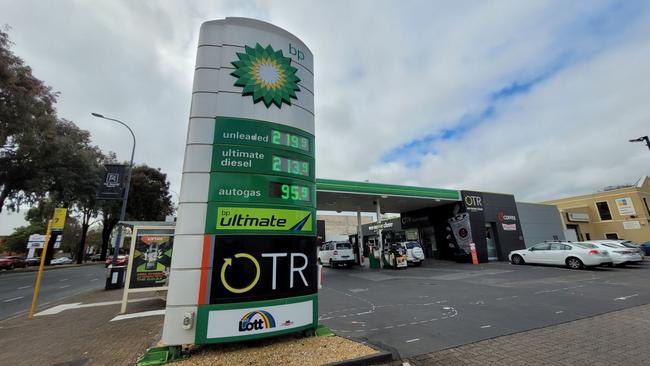Viva to accelerate its energy transition
Viva Energy will drastically refit its network of fuel stations over the next five years after completing the acquisition of OTR Group, the centrepiece of its energy transition strategy.

Business
Don't miss out on the headlines from Business. Followed categories will be added to My News.
Viva Energy will drastically refit its network of retail and fuel stations over the next five years after completing the $1.215bn acquisition of OTR Group, the centrepiece of its strategy to prepare for the energy transition that threatens to uproot Australia’s traditional fuel business.
Viva chief executive Scott Wyatt said the company would refit its Coles Express stores to run under the On the Run brand with higher-end convenience offerings designed to lure consumers to spend more time and money at the stores – much needed amid a shift to electric vehicles in which customers will be required to charge their cars for 30 minutes.
“In five years time we will have 1000 stores across Australia carrying the OTR offer and replicating the success of that business in South Australia,” Mr Wyatt told The Australian.
The reshaping of Viva, which is expected to cost more than $50m a year to complete, comes as once traditional fuel businesses look to position themselves for a future in which more and more EVs are on the road.
With the proliferation of rooftop solar, the rise of EVs will significantly up-end Australia’s petrol businesses, and Viva and rival Ampol are both looking to heighten their appeal to customers who will inevitably face longer stops to recharge.
“This is about transforming our business from being a fuel retailer that happens to sell convenience to being a nationwide convenience and food retailer that happens to sell energy,” Mr Wyatt said.
OTR generates more than 70 per cent of its earnings from non-fuel retailing as it lures customers with products such as barista-made coffee and dog-wash facilities.

The OTR deal required some negotiation with the Australian Consumer & Competition Commission but it was eventually sealed when Viva said it would sell 25 of its sites in South Australia to Chevron. It received 13 Chevron sites in other states in return.
While Viva is broadening its appeal, it maintains strong focus on fossil fuels and is hoping to profit from a looming east coast gas shortfall.
The Australian Energy Market Operator last month warned of a catastrophic shortfall emerging as soon as next winter under extreme weather conditions, which would threaten electricity supplies and the manufacturing sector.
The outlook is particularly concerning for Victoria, the most gas-dependent state. While there are warnings of supply shortages, Victoria’s Labor government has focused its policy agenda on reducing demand, widely seen as moving to stretch supplies for as long as possible.
But gas developers are struggling to unlock new supplies amid prolonged regulatory uncertainty, and some in the energy industry now believe the only way to mitigate the impact is to import LNG into the east coast during peak demand.
The situation is jarring for some. Australia is one of the world’s largest LNG exporters but is unable to pipe ample supplies in Queensland, Western Australia and the Northern Territory in sufficient quantities.
Viva hopes to fill the void, creating an LNG import terminal at Geelong, but plans were hindered when the Victorian Labor government led by then premier Daniel Andrews asked for more environmental studies.
Mr Wyatt said Viva would complete those studies in the next few months, with the government on course for a critical decision by the end of the year.
“Before the middle of this year, then it will go back to public consultation, and then we will go back to the Victorian government for approval,” Mr Wyatt said. “We’re very confident we have addressed additional questions, or we will have addressed the additional questions.”
The decision will be a test case of Victoria’s attitude towards gas. Outwardly, it is apparently sceptical about gas, but industry sources said it was privately expressing concern about the supply crunch facing the state.
More Coverage
Originally published as Viva to accelerate its energy transition





